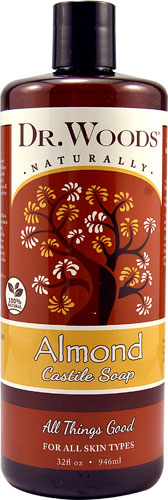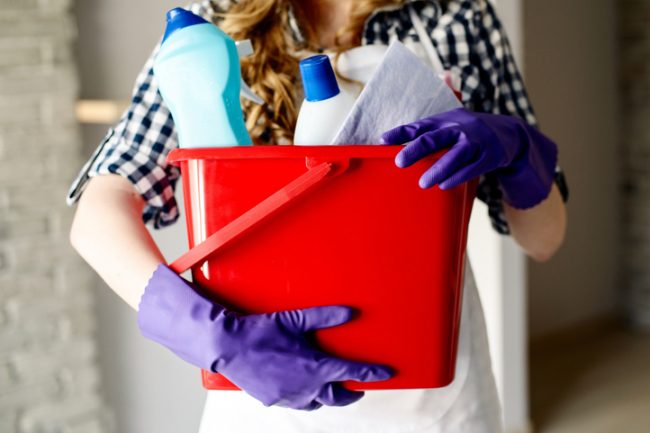Cleanliness is next to godliness—or so it’s been said—and most of us ascribe to this ideal, preferring to keep our homes, offices and cars free of dirt, germs and bacteria.
What we don’t prefer is the overall ick that’s often left behind after we’ve cleaned with commercial products—and we don’t mean ick of the dirt sort. Whether it’s a citrus-scented “grease fighter” or a peacock-blue toilet cleaner, the stuff that standard cleaning products create in their wake—from overpowering smells to our six-year-old’s watery eyes and sneezes—sometimes puts our best intentions to question.
At the same time, controversy abounds around the safety of conventional household cleaning products. Some argue they’re as toxic to human health and the environment as rat poison; others insist they’re perfectly acceptable in small amounts.
With that in mind, here’s what you need to know—and how you can keep you and your loved ones safe:
What’s hiding in your home
Opponents of commercial cleaning products have much to assert. First, environmental experts state that the average household contains a minimum of 62 toxic chemicals. (These aren’t just in window cleaners, either—personal products, such as perfume and lotion, can contain potentially harmful ingredients like parabens and phthalates.) Exposed to them routinely, and we may face mild symptoms like skin irritation and itchy eyes, or major symptoms like reproductive issues and asthma.
What’s more, there’s no regulation of what goes into, say, our oven cleaner. As senior scientist at the Environmental Working Group (EWG) Rebecca Sutton, PhD, says, “In terms of household cleaners, neither ingredients nor products must meet any sort of safety standard, nor is any testing data or notification required before bringing a product to market.” Is it any wonder, then, that some products include warning labels that say “may be hazardous to humans and pets?”
Manufacturers, on the other hand, argue that in minute amounts, these chemicals have no sway on our health, conceding that if someone downed a liter of commercial cleanser, then, yes, they’d face grave consequences, but that otherwise, they’re safe for use. Experts readily disagree, however—and cite evidence to support their declarations. Indeed, according to a study out of Norway's University of Bergen, regular use of cleaning sprays was shown to be on par with smoking 20 cigarettes per day, with scientists from the study determining that commercial products “may constitute a risk to respiratory health, not only in terms of asthma as previously shown, but also in terms of long-term impact on lung function decline.”
The National Institutes of Health supports this, stating that cleaning products “contain a multitude of chemical substances with known health effects” in terms of the skin (such as rashes and burns) and the respiratory tract (e.g.: breathing problems.) The Cleveland Clinic adds to this as well, pointing out that if, for example, a child ingested laundry detergent (which is responsible for “many household poisonings from accidental swallowing”), they could experience “nausea, vomiting, shock, convulsions and coma.” Sound terrifying? It is.
Clean with care
Whether you’re loathe to let go of that commercial bottle you just bought or are on the other side of the controversy, here are a few ways to keep yourself safe.
First, be judicious—and use cleaning products sparingly. It’s easy to spray away; but the greater concentration of ingredients, the greater the potential risks.
Additionally, avoid mixing chemicals, as it may cause more damage. This is particularly true with bleach. As the American Lung Association reminds us, never mix any product containing bleach with ammonia. (“The gases created from this combination can lead to chronic breathing problems and even death,” they say.) Also, to minimize exposure, wear gloves and a mask while cleaning, and safety googles when you do clean your oven. Wash and dry hands promptly, and ensure the room you’re cleaning has proper ventilation. What’s more, shun anything that contains formaldehyde and chloroform, both of which are known carcinogens.
Green clean
That said, if you’re intent on safeguarding your personal health—and the health of the environment—making the switch to eco-friendly household cleaning products is a cinch. Here’s how:
1. Reach for essential oils
From lavender and lemon to orange peel and peppermint, there’s a plethora of essential oils from which to choose, allowing you to fill your home with pleasant scents as you sanitize it. Their uses also extend far and wide. Lemon essential oil, for example, can be mixed with olive oil to polish your wood, while cinnamon leaf is a terrific addition to homemade mildew spray, thanks to the force it has against mold.
2. Go for fresh air rather than a plug-in air freshener
Walk into a restaurant bathroom or a doctor’s waiting room and chances are you’ll get a strong whiff of an air freshener. But as much of a staple as these have become, they may be doing damage to your health. As the Natural Resources Defense Council reports, “many of these products contain phthalates—hazardous chemicals known to cause hormonal abnormalities, birth defects and reproductive problems.”
Still want your rooms to smell fresh? Again, reach for essential oils, create your own natural air freshener spray, invest in a bouquet of organic flowers (or stems from your own garden), place a vase of rosemary or thyme on your table—or simply open the window and let in the fresh air.
3. Use Castile soap
Coffee stains on your clothes, grass stains on your carpet, ink stains on your…drapes? As we all know, anything can happen, but that doesn’t mean you need to seek out chemically-laden spot removers to get immaculate again. Undiluted Castile soap, made with olive or coconut oil, usually does the trick with laundry stains—just be sure it’s not mixed with soy or canola (which tends to mean it’s been genetically modified) or glycerin, fragrance and citric acid. For other household spots, go for a non-toxic household cleaner like Ecover or Better Life's Stain & Odor Eliminator with eucalyptus and lemongrass.
4. Don’t be fooled by “green” advertising
Myriad products claim to be “green” and “non-toxic”—and are anything but (think of Sutton’s remarks). One of the worst offenders, for example, is Simple Green Concentrated All-Purpose Cleaner. Labeled as biodegradable and non-toxic, according to the EWG it contains 2-butoxyethanol (“a solvent absorbed through the skin that damages red blood cells and irritates eyes”) and “a secret blend of alcohol ethoxylate sufactants”—and “some members of this chemical family are banned in the European Union.” For this reason, be sure to read the labels of the “safe” products you’re purportedly buying (and for a full list of the EWG’s most harmful products, go here.)
5. Go basic
A simple Google search will reveal tons of recipes for non-toxic cleaners you can make in your own kitchen—and often with ingredients that are already in your own kitchen, such as vinegar, baking soda and lemon. But for a basic but effective all-purpose cleaner, simply mix tea tree oil with vinegar and water in a BPA-free spray bottle—then, if you so wish, add an essential oil of your choice for a pleasing, non-ick fragrance.




